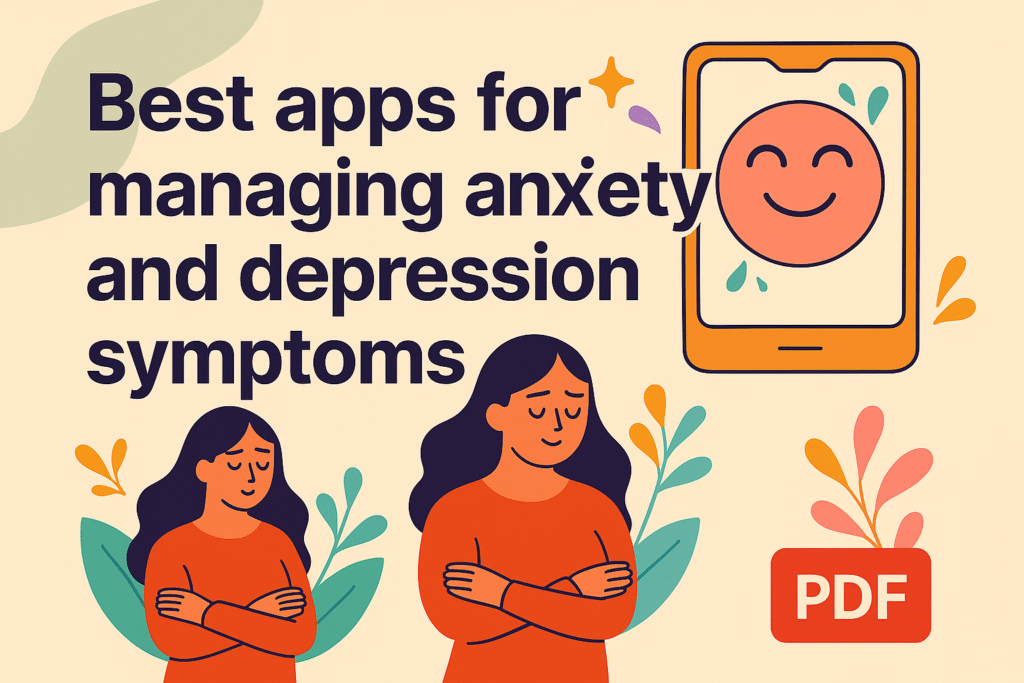Anxiety and depression are two of the most common mental health challenges today — yet they often go unnoticed, misunderstood, or untreated. Whether it’s a constant state of worry, sudden emotional lows, or feeling disconnected from life, these symptoms can deeply affect your productivity, relationships, and sense of self.
But here’s the truth: you are not alone — and you are not powerless. Understanding your symptoms is the first step toward regaining balance and strength. This blog helps you in Managing Anxiety and Depression Symptoms: A Practical Guide for Everyday Life.
🌪️ Recognizing the Signs Early
Anxiety and depression don’t always appear dramatically. They often slip in quietly through subtle signs, such as:
- Feeling tired even after sleeping
- Loss of interest in things you once enjoyed
- Overthinking or uncontrollable worry
- Difficulty concentrating or staying organized
- Physical symptoms like headaches, chest tightness, or appetite changes
Identifying these signs early helps you respond before they intensify.
🔄 Understanding the Mind-Body Connection
Mental and physical health are deeply intertwined. Chronic stress from anxiety can lead to digestive issues, weakened immunity, and sleep problems. Depression can lower energy levels and make even small tasks feel overwhelming.
When your body feels off, your mind suffers — and vice versa. Managing both together is key to true healing.

💡 Simple Yet Effective Daily Strategies
While every person’s journey is unique, certain daily habits have shown strong benefits in managing symptoms:
🧘♀️ Practice Mindfulness
Start or end your day with 5–10 minutes of quiet breathing, meditation, or gratitude reflection. It reduces overthinking and grounds your emotions.
🏃♂️ Move Your Body
Regular physical activity — even a walk — boosts mood-regulating chemicals in the brain. It’s one of the most accessible tools for mental clarity.
📓 Track Your Emotions
Writing down your thoughts can help you recognize patterns, triggers, and progress. It also allows emotional release without judgment.
💤 Prioritize Rest
Establish a sleep routine that includes winding down early and avoiding screens before bed. Quality sleep directly affects mood and anxiety levels.
🤝 Talk to Someone
Whether it’s a friend, counselor, or support group, talking can ease emotional weight and offer fresh perspectives.
📵 Limit What Drains You
Not all routines are helpful — some worsen symptoms. Consider reducing:
- Overuse of social media
- Negative news consumption
- Excessive caffeine or sugar
- Overcommitting and lack of boundaries
Replacing these with nourishing habits creates mental space for healing, Managing Anxiety and Depression Symptoms it is a Practical Guide for Everyday Life.
🎯 Focus on Progress, Not Perfection
Managing anxiety and depression isn’t about “fixing” yourself. It’s about building awareness, resilience, and kindness toward your mind. Some days will be harder — and that’s okay. What matters is showing up for yourself, little by little.
📘 Want to Go Deeper?
This blog offers a starting point to understand and manage symptoms. However, for individuals looking for a methodical, scientifically supported approach, daily activities, emotional self-assessments, and professional advice…
Visit more blogs for your daily life problems here

